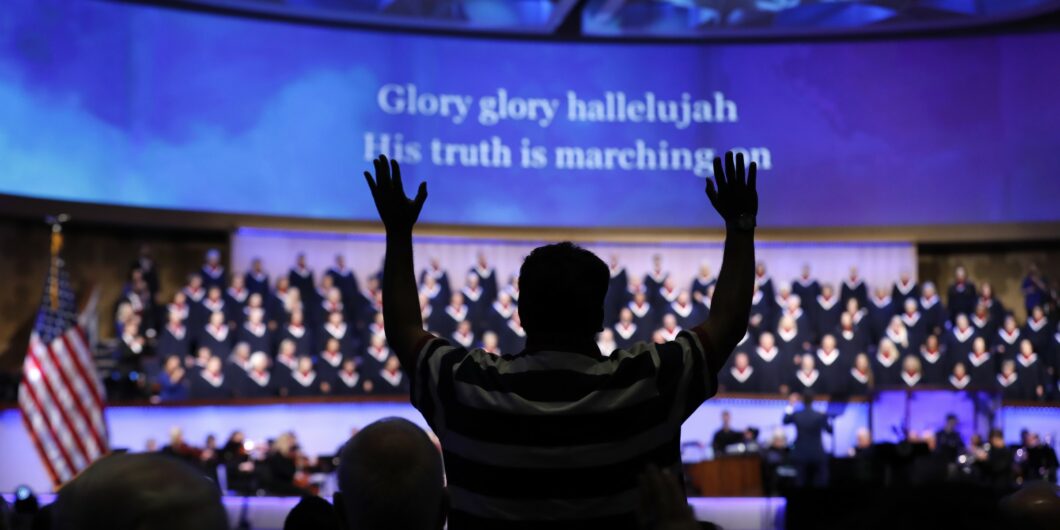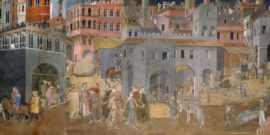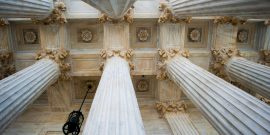Grounding politics in “religion,” does not solve any of the problems Buckley identifies in the natural law, it just pushes them further down the road.
What’s Left to Say About Evangelicals?
Since 2017 the study of American evangelicalism has featured a barrage of books that seemingly prove this religious group’s bad manners and uncivil politics. This perspective circulated even before the 2016 election of Donald Trump, to be sure. But with the election of Trump and the four-year, almost daily reminder of evangelical hypocrisy—headlines regularly repeated that “Eighty-One Percent of White Evangelicals Voted for Donald Trump”—the study of evangelicalism took an abrupt U-turn. Tim Alberta’s, The Kingdom, The Power, and The Glory is the most recent book to evaluate evangelicals from the perspective of shock if not horror. For readers familiar with Christian reflection on politics, which begins at least with Augustine and extends to the likes of John Witherspoon or William Gladstone, Alberta’s sensitivity will be annoying.
Until 2015, the dominant scholarly approach to white evangelicalism was shedding light on a group of Protestants outside the mainline denominations whom scholars had ignored. This scholarship began in earnest around 1980 with the work of George M. Marsden, then at Calvin College, Mark A. Noll at Wheaton College, and Nathan O. Hatch, then academic dean at University of Notre Dame. They had a hand in producing a body of work that accounted for the rise of evangelicals after World War II with Billy Graham as their celebrity figurehead. The narrative that explained the Protestants who formed new institutions, such as the National Association of Evangelicals (1942), Fuller Seminary (1947), and Christianity Today magazine (1956), traced their roots back to Puritans in colonial North America, spiritual awakenings led by the likes of George Whitefield (1740s) and Charles Finney (1820s), down to the so-called fundamentalist controversy (1920s) when conservative Protestants began to leave the historic and largest Protestant denominations over theological liberalism. Though evangelicals were Protestant, they qualified for fresh examination because they were outsiders (along with the black church, Roman Catholics, women, and more) in a field that assumed American religion was mainline Protestantism.
As dubious as the diversity rationale now appears—how could white Protestants be outsiders in white Protestant America?—the study of evangelicals coincided with the need to understand a new and vigorous electoral bloc, namely, the Religious Right. Once Jimmy Carter revealed that he was a born-again Protestant in the 1976 presidential contests, and once journalists and scholars wanted to know more about that kind of Protestantism, scholarship on evangelicalism became more than filling in the historical record. It was also needed to understand a big part of the Reagan coalition.
The election of 2016 practically took all scholars by surprise (some needed smelling salts). It also gave legitimacy to scholarship that explained Donald Trump’s popularity among white evangelicals. Several evangelical scholars went to work to explain the racism, psychological instability, and misogyny that contributed to born-again Protestant votes for Trump. At the same time, evangelical leaders and pundits piled on with books of their own (for instance, David French, Russell Moore, and Peter Wehner) that show evangelicals to be hypocritical Christians and unreliable citizens. What used to be a success story of an obscure group rising to prominence in American life, evangelicalism is now one of the many social ills responsible for spreading illiberal sentiments among the American people.
Alberta seems to be unaware of the vast literature but this has not prevented him or his publisher from receiving a wide reception in mainstream journalistic outlets for a book that reinforces the prevailing perspective on white evangelicals. In the prologue to The Kingdom, The Power, and the Glory, Alberta devotes one paragraph in an almost 500-page book to two scholars, David Bebbington and George M. Marsden, to write that a scholarly definition of evangelicalism has drawn “its share of criticisms.” Maybe because “there remains no real consensus around what it means to be an ‘evangelical,’” Alberta feels at liberty to ignore almost forty-five years of study. His lengthy acknowledgments also reveal no interaction while writing with scholars who study American Christianity. At the end of all those he thanks, Alberta adds an expression of gratitude to the Detroit Lions who had just defeated the Kansas City Chiefs on opening day of the 2023 NFL season. Readers may well wonder how serious the book is. Imagine having fun with professional football when white evangelicals are threatening the United States of America. Even more of a head-scratcher is writing a book with little scholarly awareness when the mantra, “follow the science,” is still echoed across America.
Even so, Alberta’s book is not without virtues. He does report on several evangelical pastors who do not register on the radar of journalists and scholars. Alberta traveled around the United States to primarily small cities and attended events or interviewed pastors in settings that journalists who work on the East Coast rarely visit—among them Brighton, Michigan; Montgomery, New York; Columbus, Ohio; Mt. Juliet, Tennessee; Erie, Pennsylvania; Branson, Missouri; Kennesaw, Georgia; Brentwood, Tennessee; and Jeffersontown, Kentucky. He visits two locales twice—Brighton, Michigan and Lynchburg, Virginia. The latter, many readers will know, is the home of Liberty University, the institution founded by Jerry Falwell and later presided over by his son, Jerry Falwell Jr., a prominent evangelical supporter of Donald Trump who resigned after revelations of inappropriate behavior. Alberta’s chapters on Liberty University cover familiar ground but add arresting details, for instance, about students from the 1970s and their children’s current ties to the school, or a professor terminated for challenging the administration in classes on the Bible. As revealing as these chapters are, they get lost in a cascade of other places and names. This has the ironic effect of making Liberty look less toxic.
Alberta’s chapters on Brighton, Michigan not only frame the book but give away the author’s bias. This small town, roughly twenty miles north of Ann Arbor and forty-five miles east of Lansing, is the site of Cornerstone Evangelical Presbyterian Church, the congregation where Alberta’s father, Richard, was pastor. It is also the church home where Tim Alberta grew up as an evangelical Protestant. The first of the two chapters describes the fraught relationship the congregation had with the pastor who succeeded Alberta’s father (after his death). COVID-19 was the first sign of trouble. The new pastor, Christopher Winans, refused to defy Governor Gretchen Whitmer’s pandemic protocols on meetings and masks. The most Trumpy segment of the congregation turned on Winans. The unpeaceful protests on January 6, 2021, only increased tensions in the congregation, especially among church members who thought Winans had been too cautious during the riots after George Floyd’s death. Seven chapters later, Alberta returns to Brighton to cover another Protestant congregation that a Cornerstone church member had joined after giving up on Winans. The pastor at this other congregation fused Trumpian populism with religious renditions of American exceptionalism.
Alberta’s understanding of politics has almost nothing to say about the importance of government for maintaining social order.
Alberta devotes more than two chapters to Brighton since he begins (prologue) and ends (epilogue) The Kingdom, the Power, and the Glory with two personal experiences at Cornerstone church. The book opens with Alberta’s account of the funeral service for his father where Alberta himself gave a eulogy. In those remarks, he decided to ask why church members listened to Rush Limbaugh in their cars instead of old sermons by the elder Alberta. “Garbage in, garbage out,” Alberta explained. People responded with “nervous laughter.” Later, back at the Alberta home where family and friends had gathered for the standard post-funeral buffet, Alberta initially felt at ease with friends and family. But one church member handed him a “screed” of a letter that condemned Alberta for undermining Trump. When Alberta showed the letter to his wife, she blurted out (and “made the church ladies jump out of their cardigans”), “What the hell is wrong with these people?”
As telling as that episode is for framing Alberta’s book, the Brighton Protestant who has the last word is Winans, the pastor who managed to hold on to his call at Cornerstone. In the epilogue, Alberta returns to Brighton where Winans delivers a sermon on the significance of spiritual truths compared to the triviality of politics. The pastor tells Alberta that evangelicals are not winning the culture wars because they are playing the “wrong game.” Politics is distracting them from evangelism, religious formation, and proclamation. Too many evangelicals “have become captive to a cultural religion” that either reaffirms “their existing dogmas” or leaves them “undefiled.” For effect, Alberta added his own “Amen.” The very last word in the book comes from Winans who quotes the apostle Paul, “So we fix our eyes not on what is seen, but on what is unseen, since what is seen is temporary, but what is unseen is eternal.”
Because the book begins and ends with Alberta’s home church, readers may reasonably conclude that the book is more memoir than journalism. Librarians have determined to shelve The Kingdom, The Power, and the Glory with other books on Christianity and politics, and religious nationalism. But that professional judgment cannot compensate for a book that is as personal as it attempts to be descriptive. Alberta is clearly conflicted about his youth. He dedicates the book to his father, “a sinner, like his sons.” But he writes as if Chris Winans, Richard Alberta’s successor, is a much better guide to the church and politics than his father was. Alberta’s “reporting” then becomes a way for him to find better and worse alternatives to his father. Trumpists like Jerry Falwell Jr. make AlbeTrappistsrta’s father look not-so-bad. But other voices, like Russell Moore, Peter Wehner, and Tim Keller, become Alberta’s new guides to Christianity.
The irony is that Alberta displays the same weakness on Christianity and American politics that MAGA evangelicals do. He, like evangelicals, struggles to look at politics between the high of sacral significance and the low of wicked selfishness. The reason has to do with evangelical piety that looks at all arenas of human existence as having religious significance: if a believer’s life is truly transformed, that spiritual reorientation must be evident in all walks of life—including politics. Because Alberta now sees that American politics is inherently corrupting, he calls fellow believers to flee the sinful realm of civil rule and devote their energies to the religious mission of the church. Drag Queens and Critical Race Theory are not “obstacles to saving souls” but politicized Christianity is. Alberta quotes Russell Moore to show that “the normal state of the Christian life … is to live in a state of homelessness” because evangelism is the mission of the church and it is not a means to “teach civics.” Alberta himself concludes that Jesus’ words to Pilate—“my kingdom is not of this world”—indicate that true power is not in government or the nation-state but in Jesus. “The power to raise taxes is not the power to raise Jesus from the dead.”
Alberta winds up reverting back to the outlook of fundamentalists before the evangelicals of Billy Graham’s generation rejected separatism and sought to influence American society. What is particularly surprising about Alberta’s neo-fundamentalism is that he writes this way in 2023, almost a generation and a half from the beginnings of the Religious Right. When evangelicals started out in politics during the Reagan era, they had few people with the skills to work in policy circles or staff government agencies. By George W. Bush’s administration, that situation had changed and evangelicals could point to scholars’ and analysts’ academic training and professional experience, well qualified to work in government. To be sure, the Iraq War and the Great Recession alerted evangelicals to the downside of politics, and as early as 2007, some evangelicals began to have second thoughts about Christian politics. But for people inside think tanks and government offices, who had firm religious convictions and a sense of public service, working inside the offices of law and policy was still a worthy calling. Alberta seems to be calling all of these evangelical strides into question. The reason—make no mistake—is Donald Trump. If the former president is the telos of evangelical politics, then believers should flee political power—period.
Alberta’s understanding of politics, in the end, has almost nothing to say about the importance of government for maintaining social order, Christian callings as citizens, as well as the compromised nature of civil rule—if only because the state uses force legitimately rather than heeding Jesus’ instruction to turn the other cheek. Alberta’s book has no trace of Augustinianism. The bishop of Hippo may have been wrong about some things, but he was realistic about the need for government in a fallen world and the legitimacy of Christians serving in public occupations. He was also especially sober-minded when distinguishing the ultimate good of Christianity from the proximate goods of civil government. If Alberta had considered the long history of Christian reflection on politics—the one starting not in 1980 but in 350—he might have found a way to make sense of, appreciate, and correct his father.



